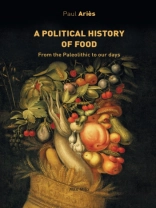How was human (in)equality built across the table? Why were the first great banquets at the origin of the communal goods of humanity? Who, after forcing men from eating bread, wanted to forbid them chestnuts and popularized the potato? The Egyptian food table invented the notion of "symbols for food." The Greek food table invented the notion of sharing. The Roman food table invented the concept of pleasure. How was the person, caught eating and drinking alone, punished? Why did people die less of hunger in ancient times than in Africa in the 21st century? Why in China do people eat round things to show their love? How and why do we choose to eat this way? Why do societies choose to express their unity through their conception of the food table? Did the division in prehistoric societies first occur at the dinner table? Did the first great civilizations make the food table a major political tool with the rationing and banqueting systems in Mesopotamia and Egypt? Were the Gallic food tables swept away by the political alliance between the Catholic Church and the new masters coming from the great invasions? Did the feudal politico-religious system durably structure our food table? Did absolute monarchy have to invent its own conception of the food table with music, dance and architecture? What were the great French revolutionary conceptions of the food table? Did the philosophy of the Enlightenment change our conception of the food table? Did the French Revolution impose a new way of eating with the adoption of the three-fold table service and the banning of cuisine made with mixtures and knots? Does the grammar of our food correspond to a social project? Was Robespierre afraid of the great popular banquets? Did the Republic enforce the eating of potatoes instead of the "breadfruit tree" (the chestnut tree)? How was the myth of Parmentier imposed on schools? What were the great food utopias in the history of the world?Paul Aries invites you on a gourmet journey from prehistory to the present day. You will know (almost) everything about what our ancestors ate and drank. The prehistoric food table, the ancient food table, the Gallic food table… Paul Aries shows how the tables of the world remain largely dependent on the tables of the past. This political history of food is the result of thirty years of teaching and research. Better known as a political scientist specializing in ecology than as a specialist of the food table, Paul Aries has been teaching since 1988 in the most prestigious international hotel schools. He is the author of La fin des mangeurs (DDB), Les Fils de Mc Do (L’Harmattan), and Manger sans peur (Golias).
Paul Aries
Political History of Food [EPUB ebook]
From the Paleolithic to the Present
Political History of Food [EPUB ebook]
From the Paleolithic to the Present
Купите эту электронную книгу и получите еще одну БЕСПЛАТНО!
язык английский ● Формат EPUB ● страницы 448 ● ISBN 9782315010912 ● издатель Max Milo Editions ● опубликованный 2023 ● Загружаемые 3 раз ● валюта EUR ● Код товара 9098052 ● Защита от копирования Adobe DRM
Требуется устройство для чтения электронных книг с поддержкой DRM












